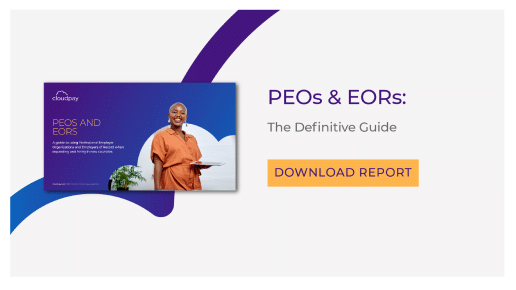Professional Employer Organizations (PEOs): What are they and are they right for you?
If you’re operating a business that wants to optimize its human resource and payroll functions, then outsourcing to a Professional Employer Organization (PEO) can often help you do just that. Using a PEO is especially valuable if you want to add to the human resource and payroll skills you possess in-house, want to achieve and maintain compliance with regulations in multiple territories, or simply if you’re struggling to handle all your responsibilities as your company scales upwards.
This guide covers all the key basics around PEO services: how they work, the pros and cons of using a PEO, the factors to consider when deciding to use one or not, and the potential alternatives that are out there.
3.7 million: The number of people
employed by PEOs in the USA
(napeo.org)
“What is a Professional Employer Organization and how does it work?
A PEO is a third-party organization that can manage many key employment functions on your behalf. Generally speaking, a PEO and the company in question will formulate a Client Service Agreement (CSA) which sets out the scale of the work that a PEO will take care of.
Every PEO is different which means there can be some variety in the range of services that are offered, but it’s common to see the following:
Administration of payroll and pay for your full workforce, wherever they may work, and in full accordance with relevant payroll regulations, including the withholding and remittance of tax and social security
HR management
Full management of the HR services within your organization, such as recruitment, training, onboarding, compensation claim processing, risk assessment, policy drafting and enforcement, discipline, conflict resolution and more
Benefits
Management of all benefits that employees receive and are entitled to, such as healthcare, dental plans and employee perks. This includes the onboarding process to ensure that all employees are aware of their benefits, and have suitable access to them
Compliance
HR and payroll regulations vary substantially from one country to another, and are liable to change on a regular basis. A PEO can keep on top of any changes thanks to their deep experience and expertise, and ensure all your HR and payroll operations remain compliant at all times
It’s worth mentioning that PEOs are normally designed to complement payroll and HR teams, rather than replace them in their entirety. Furthermore, the ability to make key operational decisions, as well as legal responsibilities, should remain with your business. For these reasons, using a PEO is also often referred to as ‘co-employment’.

The advantages of using a Professional Employer Organization
Using PEO services in the right way can have major benefits for your organization, not only in direct terms for payroll and HR, but throughout your business as a whole:
Freeing up in-house resource
A PEO can take care of key duties, including some that are particularly time-consuming. This means your in-house HR and payroll staff can devote more time to core duties, as well as those that can add more value to the business. Whilst this is a benefit for small businesses, larger organizations can reap benefits here too.
Greater cost efficiency
Outsourcing HR and payroll tasks to a PEO that has deeper expertise and greater resources can deliver substantial cost efficiencies. According to NAPEO, the national association for PEOs in the United States, using a PEO can typically deliver an annual return on investment of 27.3%.
Wider access to employee benefits
PEOs generally support large numbers of businesses and their employees, meaning they have significant buying power when it comes to arranging benefits like perks, health insurance and other healthcare plans. As a result, they may be able to secure benefits for your workforce at more advantageous rates than your business would be able to obtain by itself.
Reduced risk of non-compliance
The expertise of a PEO means there is a much lower risk of mistakes being made that lead to penalties for non-compliance. Additionally, many PEOs will be insured against any accounting or payroll errors, meaning they will cover any financial penalty in these situations rather than leaving your organization out of pocket.
Better talent attraction and retention
Better benefits and more comprehensive payroll and HR experiences can all make employees feel more positive about their work and valued by their employer. Not only can this boost productivity and inspire employees to stay with your business long-term, but it can act as a strong selling point at a time when prospective new hires are increasingly prioritizing employee experience.
Peace of mind:
The risk of non-compliance, overloaded HR teams and employee satisfaction can be stressful for business managers, but a PEO can relieve these burdens and allow you to operate and grow with confidence and reassurance.
$147 million: Expected value
of PEO market by 2030
(napeo.org)
The potential pitfalls of using a Professional Employer Organization
Using a PEO can be highly beneficial, but it isn’t always a win-win situation. There are a number of potential hazards to watch out for when you explore your options: depending on the specific nature of your business, some of these may be a bigger issue for you than others…
Lack of data and process control
If you use a PEO, they will assume ownership of your payroll data and control over your payroll processes. This can cause problems if the PEO doesn’t offer any possibility for process customization, and can limit your flexibility when PEOs have prescribed benefits arrangements with their preferred vendors.
Potential legal liability
There can be significant variation in PEO services in terms of legal liability and responsibility. As mentioned in the advantages section, many are insured against issues arising from accounting errors. However, this may not always be the case: for example, if your PEO makes mistakes when filing tax-related information, you may still be held responsible by the authorities. It’s vital to check the legal details with any PEO before signing up for their services.
Delays in communication
Any good PEO will have several different companies they serve, meaning you won’t always get their undivided attention. You may not get the speedy communication and issue resolution that you might get in-house, which can be a problem on occasions where quick action is required.
Possible alternatives to Professional Employer Organization services
As you can see, there are pros and cons to using a PEO. But if you aren’t convinced that PEO services are right for you, then it’s well worth considering some of the other third parties that can help you with HR and payroll operations:
- Employers of Record (EORs): these companies will fulfill all the functions of a PEO, but will do so by setting up legal entities in all the countries in which you operate. They will conduct hiring, onboarding and termination on your behalf, and assume full legal liability for any employment-related issues that arise.
- Employee leasing companies: whilst they may appear similar – PEOs and employee leasing companies are actually very different things! This solution focuses solely on acquiring the services of employees on a short-term or fixed-term basis, when businesses need access to particular skills for a defined period of time.
- Human resources outsourcing organizations (HROs): this is where certain HR functions are outsourced to a third-party supplier. Unlike a PEO, they will administer the HR policies and benefits options that you define and select, rather than applying the ones that they choose.
- Managed payroll: this works in a similar way to a HRO, where payroll processing, administration and compliance are outsourced to a provider that can either replace or complement your existing payroll team
FAQs on using a Professional Employer Organization
Some of the most common questions that businesses ask about using PEO services include:
How much does a Professional Employer Organization cost? The pricing largely depends on whether you’ve got a large or small business, and therefore how many employees the PEO will have to administer. Many top PEOs charge a small basic fee (often around $40-50 per month), and then additional charges per employee.
How do I know if a Professional Employer Organization is right for me? If your HR and payroll teams are being overloaded with work, or you need to manage pay, payroll taxes and compliance in many different territories, then using a PEO can be highly beneficial. It can also help in cases where you plan to scale up in the future, or you’re looking to make active decisions to improve employee experiences.
What is the difference between a Professional Employer Organization and Employers of Record? The main difference is in legal liability. EORs will generally take on full legal responsibility for your payroll and HR functions, while PEOs take care of the duties but leave the liability with you.
In summary
As this guide demonstrates, there’s a lot to consider when weighing up whether or not to deploy PEO services. But with the right deployment in place, your business will be in pole position to satisfy employees, meet all legal requirements, and maximize the efficiency of your HR and payroll operations.





